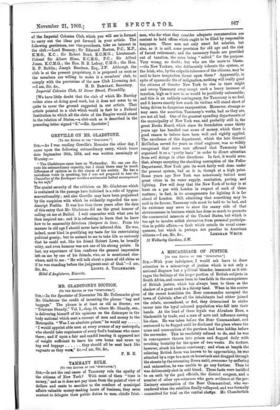TAMMANY RULE.
[TO THE EDITOR OF THE "SPECTATOR."]
Si,—Is not the real cause of Tammany rule the apathy of the citizens of New York ? With most of them "time is money," and as it does not pay them from the point of view of dollars and cents to sacrifice to the conduct of municipal affairs valuable money-making hours of business, they seem content to delegate their public duties to men. chiefly Irish- ; men, who for what they consider adequate remuneration are content to hold offices which ought to be filled by responsible taxpayers. These men not only exact fat salaries, but also, so it is said, some provision for old age and the risk of forced retirement; and the necessary funds are provided out of taxation, the rates being " salted " for the purpose. Very wrong, no doubt; but who are the more to blame, —the New Yorkers, who deliberately tolerate the system, or the Irish, who, by the culpable tolerance of the citizens, may be said to have temptation thrust upon them ? Apparently, in spite of spasmodic fits of indignation, nothing will really goad the citizens of Greater New York to rise in their might and sweep Tammany away except such a heavy increase of taxation, high as it now is, as would be positively unbearable; and this is an unlikely contingency, for Tammany is no fool, and it knows exactly how much its victims will stand short of being driven to dangerous exasperation. Moreover, strange as may seem the assertion, Tammany's works, bad as they are, are not all bad. One of the greatest spending departments of the municipality of New York was, and .probably still is, the great Docks Board, which since its foundation some thirty years ago has handled vast sums of money, which there is good reason to believe have been well and rightly applied. The excellence of this department, which the late General McClellan served for years as chief engineer, was so widely recognised that some men affirmed that Tammany had organised it on a "purity basis" in order to divert attention from evil doings in other directions. In fact, it would seem that, always excepting the shocking corruption of the Police Department, New York gets its work fairly well done under the present system, bad as it is, though at a high price. Some years ago New York was notoriously behind most great cities in its water supply, sanitation, paving, and lighting. Few will deny that the New York of to-day is at least on a par with London in respect of each of these matters ; in fact, in its arrangements for lighting it is far ahead of London. Still, admitting that something may be said in its favour, Tammany rule must be held to be bad, and its existence may serve to show the seamy side of that strenuousness in business which has done so much to promote the commercial interests of the United States, but which is too apt to involve selfish abstention from personal participa- tion in public affairs,—a fault which entails its usual conse- quences, but which is, perhaps, not peculiar to American


























































 Previous page
Previous page